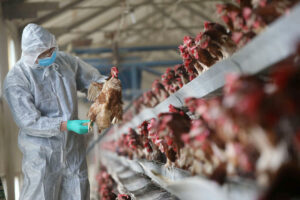THE German-Philippine Chamber of Commerce and Industry, Inc. (GPCCI) said preventive measures are urgently needed to address avian influenza (AI), which it called a threat to food security in the Philippines.
“Avian influenza remains a significant challenge for food security and the poultry industry in the Philippines,” GPCCI said in a statement dated Nov. 12.
“Recent avian influenza cases have underscored the urgent need for comprehensive preventive measures, with ongoing government surveillance and biosecurity updates,” it added.
Asked for detailed recommendations, the chamber called for the streamlining of the approval process for avian influenza vaccines “to address the urgent need for effective protection against this disease, as there is no AI vaccine yet that is registered and authorized for use,” it said.
As of Nov. 4, the Bureau of Animal Industry said seven provinces are currently affected by avian influenza.
It also cited is a single ongoing case in San Luis, Pampanga, featuring the avian influenza subtype HSN1.
On Oct. 29, the GPCCI and Boehringer Ingelheim Philippines hosted a roundtable discussion with Philippine agriculture agencies on avian influenza.
“GPCCI is honored to have created this platform for discussion, enabling the alignment of government, industry, and academic communities in addressing a critical and timely issue,” according to Christopher Zimmer, executive director of GPCCI.
“We hope to advance sustainable solutions that protect not only the poultry sector but also public health and the food security of millions,” he added.
Germany is among the Philippines’ top sources of meat, particularly beef. As of August, the Philippines imported 2.4 million kilograms of beef cuts and offal from Germany. — Justine Irish D. Tabile

